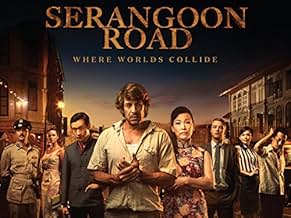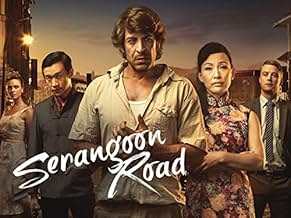अपनी भाषा में प्लॉट जोड़ेंSerangoon Road is a detective noir series set against the tumultuous backdrop of 1960s Singapore.Serangoon Road is a detective noir series set against the tumultuous backdrop of 1960s Singapore.Serangoon Road is a detective noir series set against the tumultuous backdrop of 1960s Singapore.
- पुरस्कार
- 1 जीत और कुल 6 नामांकन
एपिसोड ब्राउज़ करें
फ़ीचर्ड समीक्षाएं
Given that the series is a co-production between HBO Asia and others, what a shame that HBO Asia's very own synopsis writer clearly needs some lessons in history: "The world is changing, the global balance of power is shifting . . ." This ignores the fact that the early to mid-sixties was the height of the Cold War - a tense stand off between the West and the Communist Bloc. Only one year before this series is set the world had been taken to the brink of global nuclear warfare in the Cuban Missile Crisis. Power wasn't shifting, rather an irresistible force had gone up against an immovable object.
"The colonial rule of the British has finally come to an end and independence is on the horizon." Actually, Singaporean independence wasn't on the horizon - quite the opposite. Starting as early as 1955, as a result of post war austerity the British had been handing over power to Singapore in an orderly and gradual withdrawal. Far from seeking independence, by 1964, when the series is set, Singapore, fearing the loss of British protection, had become firmly entrenched as part of the Malaysian Federation.
"It's an exciting time where the island state can finally forge its own identity." Again, untrue. In 1965 Singapore was, very much against its wishes, expelled from the Malaysian Federation. Singapore had independence thrust upon it, independence it had not sought. Singaporeans had not led some brave freedom fighting campaign in a bid to rid itself of evil oppressors, it had been stood up - twice.
Perhaps it might be more prudent in future for HBO Asia to employ an historian to write its historical synopses rather than a Stepford Wife.
"The colonial rule of the British has finally come to an end and independence is on the horizon." Actually, Singaporean independence wasn't on the horizon - quite the opposite. Starting as early as 1955, as a result of post war austerity the British had been handing over power to Singapore in an orderly and gradual withdrawal. Far from seeking independence, by 1964, when the series is set, Singapore, fearing the loss of British protection, had become firmly entrenched as part of the Malaysian Federation.
"It's an exciting time where the island state can finally forge its own identity." Again, untrue. In 1965 Singapore was, very much against its wishes, expelled from the Malaysian Federation. Singapore had independence thrust upon it, independence it had not sought. Singaporeans had not led some brave freedom fighting campaign in a bid to rid itself of evil oppressors, it had been stood up - twice.
Perhaps it might be more prudent in future for HBO Asia to employ an historian to write its historical synopses rather than a Stepford Wife.
Not a lot of action and I don't expect a lot of Americans to flock to it but I find it captivating. Maybe if you lived there in the '60s like another poster claimed it's not authentic but I didn't live there and I quite enjoy show.
I know virtually nothing about postwar Singapore, so I find the story and setting of ABC/HBO Asias 'Serangoon Road' quite convincing. As a noir drama in a steamy tropical locale at a turbulent point in history, it's appealing viewing and beautifully shot. Serangoon Road itself is vividly recreated, and the trappings of British colonialism juxtaposed with Singaporean culture make for lavish sets.
The detective agency is the catalyst for some compelling stories that play off the political tumult of the era and the mounting racial tensions. Joan Chen is as beautiful, elegant and interesting as usual and Pamelyn Chee is a quaint, witty and clever as detective Su Ling. Her carefully cultivated accent is lyrical, and she lends the script some light moments as she fends off the advances of the persistent (but gentlemanly) CIA agent Conrad Harrison. I kind of adore her, I think she's a really fun character, and it's nice to have sympathetic and intelligent female leads in a period drama.
Don Hany really carries the show as the protagonist, Australian ex-pat Sam Callaghan. His rugged good looks and complicated past (in Changi and later the military) make him an engaging character, and Hany has the acting chops to pull this off. He's appropriately brooding and intense and, let's be honest, kind of gorgeous. Alaric Tay is great as his hapless colleague Kang, too.
Sadly Maeve Dermody, playing Callaghan's married love interest, isn't very good, and her lacklustre performance undermines the show. She seems too young and inexperienced to be convincing, and delivers most of her lines in a flat monotone without subtlety. It's difficult to understand what Callaghan sees in her. She's pretty, but awkward and hesitant. I think she's punching above her weight with this production. It's a shame they couldn't find someone with the skills to make her scenes with Hany really shine. Jeremy Lindsay Taylor is similarly unimpressive as her husband, but they haven't given him much to work with.
I enjoy this show chiefly for it's visual beauty and the period details (regardless of their historical authenticity) and for the performances of Joan Chen and Don Hany. If you're looking for something more than this, you may be disappointed, but it's worth watching.
The detective agency is the catalyst for some compelling stories that play off the political tumult of the era and the mounting racial tensions. Joan Chen is as beautiful, elegant and interesting as usual and Pamelyn Chee is a quaint, witty and clever as detective Su Ling. Her carefully cultivated accent is lyrical, and she lends the script some light moments as she fends off the advances of the persistent (but gentlemanly) CIA agent Conrad Harrison. I kind of adore her, I think she's a really fun character, and it's nice to have sympathetic and intelligent female leads in a period drama.
Don Hany really carries the show as the protagonist, Australian ex-pat Sam Callaghan. His rugged good looks and complicated past (in Changi and later the military) make him an engaging character, and Hany has the acting chops to pull this off. He's appropriately brooding and intense and, let's be honest, kind of gorgeous. Alaric Tay is great as his hapless colleague Kang, too.
Sadly Maeve Dermody, playing Callaghan's married love interest, isn't very good, and her lacklustre performance undermines the show. She seems too young and inexperienced to be convincing, and delivers most of her lines in a flat monotone without subtlety. It's difficult to understand what Callaghan sees in her. She's pretty, but awkward and hesitant. I think she's punching above her weight with this production. It's a shame they couldn't find someone with the skills to make her scenes with Hany really shine. Jeremy Lindsay Taylor is similarly unimpressive as her husband, but they haven't given him much to work with.
I enjoy this show chiefly for it's visual beauty and the period details (regardless of their historical authenticity) and for the performances of Joan Chen and Don Hany. If you're looking for something more than this, you may be disappointed, but it's worth watching.
I was looking forward to this series as I was living in Singapore round about the time the series was set. Not only that, I was living quite close to Serangoon Road so (ike reviewer 'pgmucha') I viewed the series with a hopeful sense of nostalgia. Why is the series called Serangoon Road? It is nothing like it. In reality it was/is a straight, wide street not a narrow winding lane, as depicted. One reviewer stated that it is 'not a documentary' but they should have tried to get the backdrop right at least. This was not the Serangoon Road I remember. The average temperature in Singapore is 25C with 70% humidity. However, our hero runs around and fights – but never raises a sweat . Just walking around in a climate where it is hot and humid all the time, has one dripping with sweat. People walked in the shade, not in the sun. Where are the Indians? Quite close to Serangoon Road is Little India but I could not see any Indians wandering about in this series. Geographical locations have been telescoped it seems. Bugis St is not just round the corner but a kilometer away. (I lived in a rooming house on the same floor as 4 of the 'boys' from Bugis St). Chinatown is at least 3 kilometers away. The acting is not Emmy (or even Logie) material. Joan Chen tries her best to be inscrutable. Her young female sidekick has a somewhat incongruous Oxbridge accent. The hero is suitably heroic, designer stubble and all. Does he ever change his shirt? His romantic interest however, is insipid and the epitome of 'wooden' - hardly the stuff of a a passionate love affair. The other characters are two dimensional at best. The bad guys are very bad. I don't think that in 1964 phrases such as 'pissed me off'and 'forensic accounting' were used. Overall, it was a very average production that barely held my interest A pity that it was not better researched. Yes, I know 'it was not a documentary' but it WAS a 'Hollywood generic' scenario aimed at viewers who have no idea what Singapore was/is like.
This series is meant to entertain. It doesn't claim to be a documentary or factual history or personal experience. It's just entertainment - don't expect it to be anything else. Of course there are character stereotypes standard dialogue and familiar plot lines - after more than 100 years of filming, what movie doesn't contain those things? The actors are good and the scenery and background activity appear very authentic. I've spent considerable time in Singapore (in recent years of course!), and the backdrops look real enough to me, even given that the series is set in 1964. Chill out and be entertained for a while - or watch something else.
क्या आपको पता है
- ट्रिवियाSingapore gained independence in 1961 and all vice including brothels and gambling became illegal and was closed down...this is supposed to be 1964. Singapore joined Malaysia in 1963 and became fully independent in 1965. Vice was not cleared up overnight!
- गूफ़Mandarin wasn't very commonly used for day to day conversation in Singapore during the 1960s. Regional dialects like Hokkien (Min Nan) were way more common, even amongst expatriates that spoke local languages.
टॉप पसंद
रेटिंग देने के लिए साइन-इन करें और वैयक्तिकृत सुझावों के लिए वॉचलिस्ट करें
- How many seasons does Serangoon Road have?Alexa द्वारा संचालित
विवरण
- रंग
इस पेज में योगदान दें
किसी बदलाव का सुझाव दें या अनुपलब्ध कॉन्टेंट जोड़ें
































